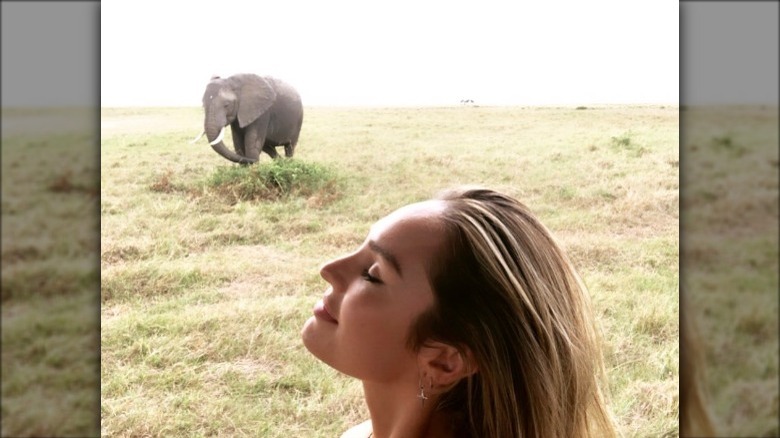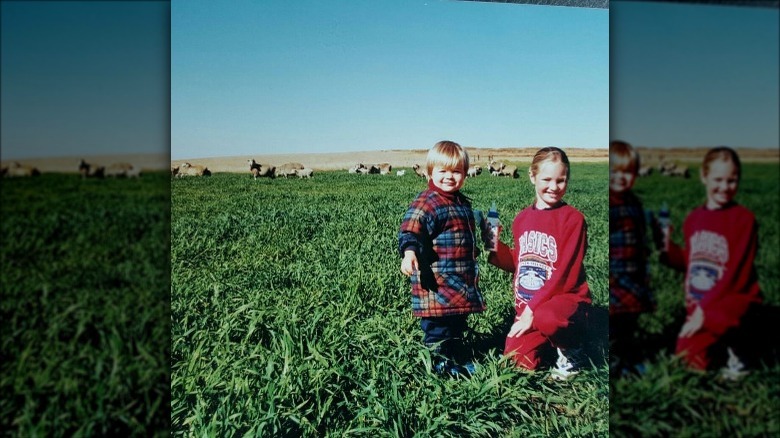Where Is Supermodel Candice Swanepoel From?
Candice Swanepoel became a world-famous face in 2010, when she joined the select group of Victoria's Secret Angels, Vogue noted. Swanepoel rose to the status of supermodel from nothing, coming from a humble background. Swanepoel embarked on her modeling career after being spotted at a flea market, she details in her website. At the time, she was just a lanky 15-year-old studying at a boarding school, where she was bullied over her looks. "I got teased because I was so thin and awkward-looking," she told GQ in 2012.
Thanks to those looks, Swanepoel went on to become worth millions, according to Celebrity Net Worth. "Revenge is always ... [laughs] I know it sounds terrible, but it does feel good to show those people," she told Telegraph. At the time of writing, Swanepoel is already living the twilight years of her modeling career. But that doesn't mean she's given all she has to offer. Swanepoel continues to apply her passion for fashion through a different medium.
In 2018, she added the title "entrepreneur" to her resume with the launch of Tropic of C, a brand of sustainable swimwear. "It started as a creative outlet," she told Forbes. "I love photography and imagery and beauty in general." But before betting on her business acumen, Swanepoel considered trying her luck on the big screen. But she had one disadvantage: her accent. "It's different when you're speaking; it's harder for me," she told GQ. While fluent in English, Swanepoel is neither American nor British.
Candice Swanepoel is a proud African
Candice Swanepoel was born and raised in Mooi River, a small village in South Africa, according to her website. Swanepoel is half English and half Afrikaner, a South African ethnic group that descends from the Dutch settlers who arrived on its coast in the 17th century, she told UBeauty's founder Tina Chen Craig on an Instagram Live in June 2022. As such, Swanepoel is an African of European descent, a concept that sometimes confuses those who are unfamiliar with African history. "You know that 'Mean Girls' quote? It happens to me a lot in real life. 'So if you're from Africa, why are you white?!'" Swanepoel told Elle in 2017.
Despite not looking like what many expect, Swanepoel is an African through and through. That's why the supermodel chose to honor her continent with the 2019 campaign of Tropic of C. "I left South Africa when I was 16 years old to pursue my career, but it never left me," she captioned an Instagram post. "You do not choose to live in Africa, Africa lives in you, and I carry Africa with me every day."
The beachwear line included plenty of animal prints, symbolizing her passion for nature — one that was instilled in her thanks to her African upbringing. "The pulsating beat of the African drum lives inside me ... my spirit ignites the music carrying me home," she wrote in the "love letter to Africa" she shared on Instagram in 2019.
Candice Swanepoel was raised on an animal farm
Candice Swanepoel grew up to be one of the most recognizable faces in the fashion industry, but she hails from a land far from the glitz and glam of the fashion world. Swanepoel was raised on a farm, an upbringing she cherishes to this today. "It was such a pure, beautiful way to grow up," she told GQ. The model and businesswoman grew up surrounded by animals, but — once again — not the stereotypical animals. "People think I have lions in my backyard," she told Elle.
But no, her everyday life was filled with regular farm animals instead. And the young Swanepoel wasn't afraid to get her hands dirty, either. "I used to wear overalls. And big boots, and poked cow poo, and helped the cows give birth," she detailed in the GQ interview. "It was a really amazing playground." That's not to say Swanepoel isn't familiar with Africa's majestic creatures. "I didn't have lions in the garden but I did go on safari for holiday," she told Elle.
Swanepoel's family has since moved from Mooi River. "They sold the farm. Because of the political and safety issues, they had to let it go," she told Derek Blasberg in 2012. Without the farm, South Africa isn't the same for Swanepoel, even though her parents still live in the country. "I don't go home that often ... it hurts. What I had on the farm I could never find anywhere else, ever again."



